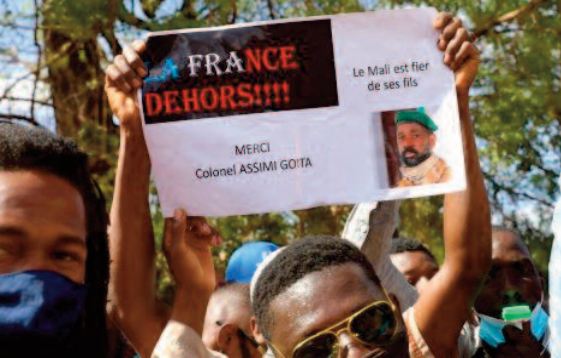
Mali’s military junta highlights the differences in its relationship with France and adds a complication, even danger, to the withdrawal of the Barkhane French force by denouncing military cooperation agreements with Paris.
The following are some of the elements that shed light on a Mali decision that the military-dominated authorities announced, on Monday, the denunciation of three agreements: – The Status of Forces Agreement (SOFA) that established in 2013 the legal framework for the presence of the Serval force, which it sent and asked France at the time to stop the Malian authorities The spread of jihadists that began the previous year from the north and threatened to invade the country. The Sofa, which regulates issues such as freedom of movement for French troops or jurisdiction in the event of an error by soldiers, was applied to Barkhane when she took command from Serval in 2014.
– Additional 2020 protocol for 2013 Sofa, to provide a framework for the future deployment of Takuba. Takoba, made up of French and European special forces, was initiated by Paris in the name of sharing efforts in the Sahel. 2014 Defense Cooperation Treaty.
France has deployed up to 5,000 soldiers to the Sahel. They fought alongside Malian soldiers for nine years, retaking the northern cities in 2013 without being able to stop the jihadist expansion towards the center and neighboring countries, despite the attendant commitment of the United Nations and foreign forces. The conflict has claimed the lives of thousands of Malians, civilians and combatants. France lost more than 50 soldiers.
Violence of all kinds precipitated a serious political crisis. The colonel overthrew the civilian president in August 2020, and ended up getting their hands on all orders of power in a second coup in May 2021.
Since then, relations have continued to deteriorate between the increasingly intractable military junta, France and its allies: the announcement of the gradual end of Barkhane in June 2021, the accusation of Mali of “abandoning the whole trip” against Paris, and the indictment against the legitimacy of the “invalid” junta accusations Mali against France’s exploitation of regional organizations, the expulsion of the French ambassador in January, and the announcement in February of withdrawal within a few months from Barkhane and Takoba, all against the background of anti-French sentiment.
Relations further deteriorate with Mali’s asylum in Russia. France and its allies accuse the military council of providing the services of the Russian security company Wagner, with controversial measures, which Bamako objects to. The diplomatic crisis coincides with the confrontation between Russians and Westerners across Ukraine.
Mali denounces the unilateralism in the decisions taken by France, according to him. He says ill will is shown in the face of his demands for amendments, and he invokes “blatant assaults” on his sovereignty. It highlights about fifty violations of its airspace by French aircraft in a few weeks, despite the establishment of a wide no-fly zone. France denies.
Un épisode récent jette de l’huile sur le feu: la diffusion par l’armée française d’images prises par un drone montrant, selon elle, des mercenaires russes en train d’enterrer des corps près d’une base tout juste parstituée France. It will be a question of accusing France of war crimes. It called on the financial authorities to “espionage” and “sabotage”.
There are about 2,400 French soldiers in Mali. Disengaging forces and equipment and dismantling bases is in itself a major and dangerous project.
The Minister of Foreign Affairs, Abdoulaye Diop, announced on Tuesday evening that the French presence no longer had a “legal basis” while denouncing the two agreements on Barkhane and Tukuba, which are applied immediately.
Paris doubts and denies any repercussions on the timetable for its withdrawal. Experts note the increased risk. “We hope there will be no military slippage” between French and Malian forces, says Niagall Bagayoko, head of the African Security Sector Network (ASSN).
It is also another unknown to the approximately 15,000 soldiers of the United Nations Force (MINUSMA). The Security Council authorized French forces to intervene in support of the Blue Helmets “in the event of a grave and imminent threat”. Its spokesman, Olivier Salgado, said any possible questioning of this “important” support would have “consequences” that the MINUSMA would adapt.

“Hipster-friendly coffee fanatic. Subtly charming bacon advocate. Friend of animals everywhere.”





More Stories
F-16 crashes in Ukraine – pilot dies due to his own error
Namibia plans to kill more than 700 wild animals to feed starving population
Endurance test for EU-Turkey relations and Ankara with Greece and Cyprus